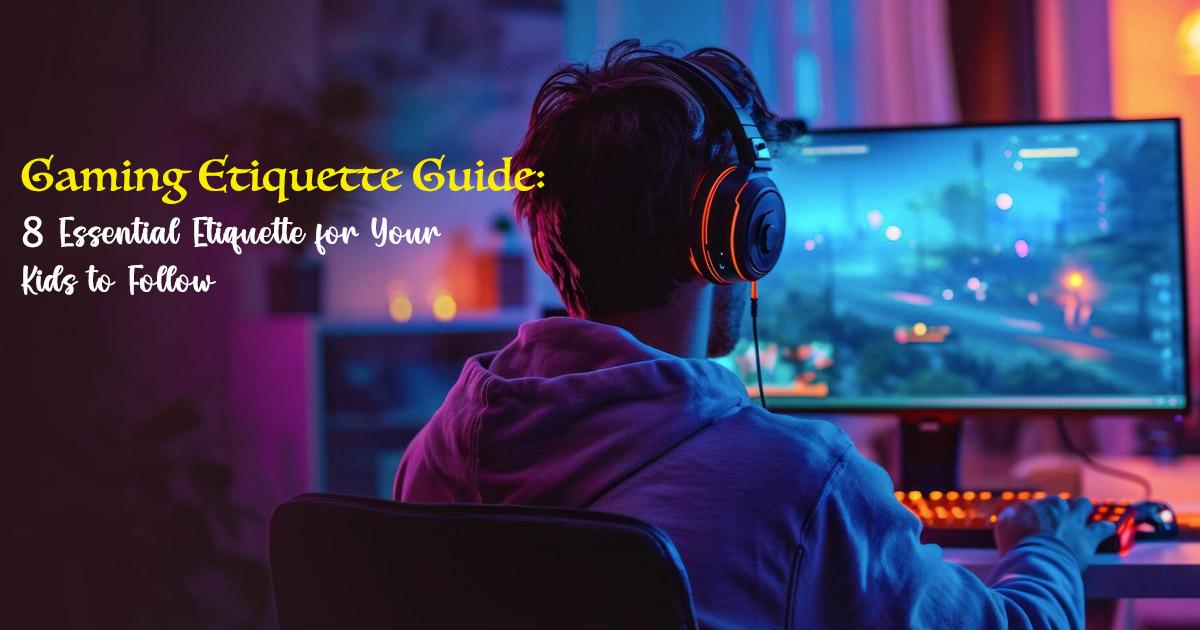Gaming Etiquette Guide: 8 Essential Etiquette for Your Kids to Follow

For many parents, the thought of their children spending hours playing video games can be worrisome. Often seen as a distraction and a waste of time, gaming is frequently criticized for encouraging bad habits. Parents are concerned that gaming might lead to a sedentary lifestyle, contributing to physical health problems or even addiction. They also worry about the behavioral impact, such as kids picking up bad language, becoming aggressive, or being disrespectful due to interactions with other players.
A study by the Anti-Defamation League found that 83% of adult gamers have faced harassment online, which is a serious issue that can affect younger players too. These concerns make it hard for parents to see gaming as a positive activity.
The Importance of Being a Good Gamer
If you allow your kids to play games online, it’s essential to teach them good gaming etiquette. Knowing how to act respectfully and responsibly in the gaming world is important for several reasons.
- First, following gaming etiquette ensures that your children have a positive experience while playing. Good behavior online makes games more enjoyable, not just for them, but also for everyone they interact with. It creates a friendly and fun atmosphere, which is what gaming should be about.
- Second, teaching your kids proper gaming manners helps them handle negative interactions better. The online world can sometimes be tough, with rude or aggressive players. By understanding etiquette, your children will know how to respond appropriately and report bad behavior if needed.
- Lastly, instilling these rules early on helps your kids develop respect and empathy. These are valuable life skills that extend beyond gaming. When children learn to treat others kindly and follow rules, they take these lessons into other areas of their lives, like school and social interactions.
Setting Rules for Good Gaming Etiquette
To ensure your kids have a positive online gaming experience, it’s essential to set clear rules about their behavior. Here are eight key gaming etiquette guidelines to teach them:
- Respect Other Players: Explain that everyone in the game is a real person who deserves respect. Treating others with kindness is crucial. You can say, “Treat other players the way you want to be treated. No name-calling or bullying.” This rule helps create a friendly and respectful gaming environment where everyone can enjoy the game without feeling bullied or harassed.
- Play Fair: Emphasize the importance of honesty and playing by the rules. Cheating might seem like an easy way to win, but it ruins the fun for everyone involved. Tell your kids, “Winning is great, but cheating ruins the fun for everyone. Play by the rules.” This teaches them the value of working hard and competing fairly, which are important life skills beyond gaming.
- Be Gracious in Victory and Defeat: Encourage sportsmanship, whether winning or losing. It’s easy to get caught up in the excitement of victory or the disappointment of defeat, but maintaining grace is important. You can say, “If you win, be humble. If you lose, congratulate the winner and try again.” This teaches them to handle both success and failure gracefully, which is valuable in all aspects of life.
- Watch Your Language: Set boundaries on what kind of language is acceptable. Swearing or using hurtful words can create a toxic atmosphere. Remind them, “No swearing or using hurtful words. Keep your language clean.” This rule helps maintain a positive and inclusive environment where everyone feels safe and respected.
- Help New Players: Promote kindness and patience towards beginners. Everyone starts somewhere, and offering help instead of ridicule can make a big difference. You can say, “If you see someone new, offer them help instead of making fun of them.” This fosters a supportive community and encourages your child to develop empathy and leadership skills.
- Limit Chat Spam: Teach the importance of meaningful communication. Spamming the chat with unnecessary messages or sounds can be very annoying and disrupt the flow of the game. Explain, “Avoid flooding the chat with unnecessary messages or sounds. It can be very annoying.” This rule ensures that the chat remains a useful tool for effective communication and strategy.
- Mind Your Mic: Ensure a quiet and respectful audio environment. Background noise can be distracting and frustrating for other players. Advise them, “Keep background noise to a minimum and mute your mic when you’re not talking.” This shows respect for other players’ experiences and helps maintain focus on the game.
- Report Bad Behavior: Encourage reporting toxic behavior instead of engaging with it. Sometimes, it’s best to step back and let the system handle bad actors. You can say, “If someone is being mean or breaking the rules, report them instead of fighting back.” This teaches your kids to handle conflicts responsibly and reinforces the idea that it’s okay to seek help when dealing with difficult situations.
Benefits of Setting Rules for Your Kids’ Online Gaming
Letting your kids play online games with clear rules can be very beneficial. By teaching them good gaming etiquette, you ensure they have fun while also learning important life skills. These rules help your kids interact nicely with others, manage conflicts well, and be kind and respectful. They also learn to handle winning and losing gracefully, which is useful in many areas of life.
Setting boundaries about language and behavior makes the gaming environment more positive and enjoyable for everyone. The lessons they learn from following these rules—like fairness, respect, and good communication—are valuable in everyday life too.
By giving your kids guidelines to follow while gaming, you help them grow into responsible, respectful, and empathetic people. So, set those rules, and watch your kids enjoy their gaming time while also developing important life skills.
